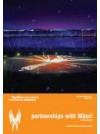Drawing from the Families Commission Act 2003 (Section 7), the Families Commission takes a strengths-based approach to the work informing its Whānau Strategic Framework. For example, as a new way to reach whānau, the Board decided to develop a partnership model with iwi and Māori organisations, who have established relationships with whānau and Māori communities, and ideas about how the Commission can contribute to their work with whānau, and vice versa.
He Waka Whānui enables the Commission to achieve its outcomes while enabling whānau to have a say in the issues that directly affect them. The partnership relationships with iwi and Māori organisations were developed at the governance-to-governance level.
He Waka Whānui has created an opportunity for the Commission to work directly with iwi and Māori organisations to influence outcomes for whānau. In the post-Treaty settlement environment, iwi are critical organisations for whānau development and the realisation of aspirations for whānau ora. Many Māori organisations have a history of working in pantribal kaupapa to advance whānau ora/whānau wellbeing. He Waka Whānui creates an opportunity for the Families Commission to work differently with whānau, hapā, iwi and Māori organisations, enabling more strategic alignment of priorities between the parties.
Purpose
You will see that the reforms we propose are wide-ranging and detailed. They need to be, to address the problems we have uncovered. But, more importantly, they are the building blocks of a big and audacious vision, a perspective on a country of the future whose founding cultures have made a lasting kind of peace, where they have given one another the room each needs to grow and, with new confidence, made space also for the later migrants to join this unique project.
We are ambitious but not unrealistic. After all, this is Aotearoa, built on a Treaty partnership that we may yet perfect.
Justice Joe Williams, Presiding Judge, Ko Aotearoa Tënei

